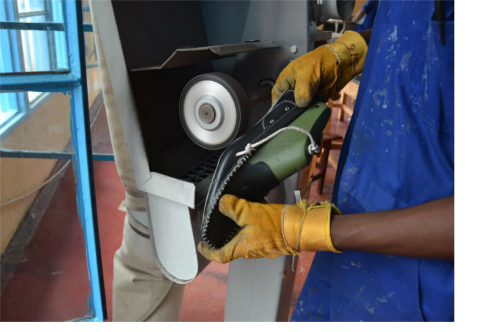
An employee at Star Leather Products Company making shoes. Employees cited lack of raw materials to make more products. / Jean d'Amour Mbonyinshuti
As government continues to try to ensure the success of the National Employment Programme (NEP), a myriad of challenges remain as far as getting Rwandans into the world of entrepreneurship is concerned.
Those efforts are articulated under the second economic development and poverty reduction programme (EDPRS2) as a tool to strengthen the coordination of employment initiatives through the establishment of a framework for better planning, implementation and coordination of employment programmes from different stakeholders engaged in job creation and employment promotion.
In the ongoing outreach by officials from various institutions, a poor mindset, poorly designed projects and lack of tools were among the key challenges highlighted.
Others include; inaccessibility of materials such as wood and leather products on the Rwandan market, and lack of capital.
The main objective is to create sufficient and sustainable jobs and equip the workforce with vital skills needed for the private sector growth and to create at least 200,000 jobs annually.
Rwandans, especially the youth and women, are encouraged to form cooperatives and join Integrated Craft Production Centres, and also work in groups.
Joyeux Nsabimana, a technician at Star Leather Products Company in Gatsibo District, said the company produces only 15 pairs of shoes per day due to lack of enough equipment and raw materials.
Nsabimana, a senior Six graduate, was hired two years ago after completing a six-month training in shoe making.
He fears that he can’t achieve his target if they keep working at the same pace.
“For instance, we are only eight people in the company and production is low compared to what we should be producing if we had enough materials,” he said.
John Mfuranzima, the company’s managing director, hinges his hope on a leather factory that’s being built in Bugesera District.
“We will be able to produce more, currently we are selling the products to neighbouring districts, but our plan is to have our products across the country and beyond,” he said.
Emmanuel Bizimana, from Cooperative des Artisans Menuisiers Ebenists (COAME), a carpentry cooperative based in Rubavu District, said they don’t have enough machines yet the market has grown.
“We manufacture modern products which we market locally and in neighbouring DR Congo, however, we still lack enough machines, even if we work as a cooperative. We find it difficult getting funding,” said Bizimana.
Officials speak out
Officials admitted that the programme still faces challenges, but they are working hard to ensure that more job creators find it easy to reach their target.
According to the Minister for Trade, Industry and EAC Affairs, Francois Kanimba, more efforts should be put in to support the programme, especially ensuring that more beneficiaries find money to buy modern machinery and raw materials.
“During our field tours, we are accompanied by Business Development Fund (BDF) officials so they can know the needs and technical specifications. That is why BDF looked for experts to identify the real specification of materials,” said Kanimba.
Innocent Bulindi, BDF chief executive officer, said experts will be working with Integrated Craft Production Centers (ICPC) to ensure that the issues are addressed.
There is over Rwf800 million for leasing materials and Rwf700 million for start-ups toolkits, according to officials.
Anna Mugabo, the director of labour at the Ministry of Public Service and Labour, encouraged more youths to go for technical skills training to become job creators.
She cited difficulty in accessing loans from banks, and a poor mindset among the youth, but noted there is optimism things will change for the better.
Since NEP started two years ago, about 24,000 projects were funded out of the 27,000 proposals submitted.